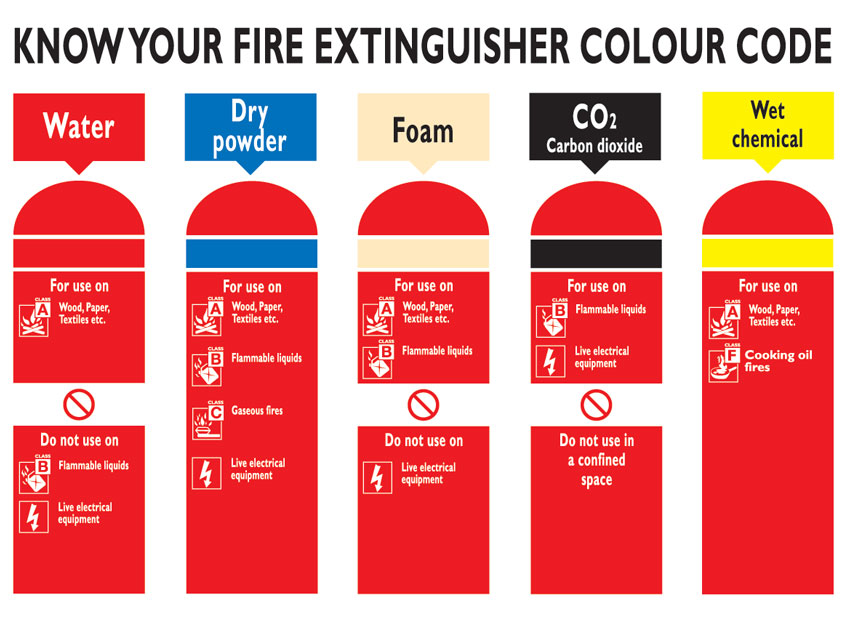Water and Foam fire extinguishers extinguish the fire by taking away. Dry Chemical fire extinguishers extinguish the fire primarily by interrupting. Class B extinguishers are rated for fires involving flammable liquids such as kitchen grease, gasoline, oil, solvents and oil-based paint.
A 10-B extinguisher can cover square feet of fire. ABC Powder Fire Extinguisher. An ABC powder fire extinguisher has numerous advantages as it is. A carbon dioxide fire extinguisher (CO2). Carbon Dioxide Fire Extinguisher.
Wet Chemical Fire Extinguisher. The wet chemical extinguisher is a specialized type. The water component of this extinguisher removes the heat of the fire ,. This extinguisher removes the chemical reaction of a fire ,. Fire extinguishers should tell you what type they are, and what class of fire you can use them on. In an emergency, do you really have time to check? Portable Fire Extinguishers Extinguisher Basics.

Different types of fire extinguishers are designed to fight different types of fire. The three most common types of fire extinguishers are: air pressurized water , CO ( carbon dioxide ), and dry chemical. The following table provides information regarding the type of fire and which fire extinguisher should be used. Understanding fire extinguisher classes. There are four classes of fire extinguishers – A, B, C and D – and each class can put out a different type of fire.
Multipurpose extinguishers can be used on different types of fires and will be labeled with more than one class, like A-B, B-C or A-B-C. You should have the right types of fire extinguisher for your premises, or you may not meet current regulations. The various types of fire extinguisher put out fires started with different types of fuel – these are called ‘classes’ of fire. It is not intended for use on an out-of-control fire , such as one which has reached the ceiling, endangers the user (i.e., no escape route, smoke, explosion hazar etc.), or otherwise requires the expertise of a fire brigade.
A fire extinguisher is an active fire protection device used to extinguish or control small fires, often in emergency situations. Quick Response Fire Supply Offers Fire Extinguishers And So Much More. This type of fire extinguisher is simple to use. However, water fire extinguishers are only suitable for class A fires, which are fires involving solids.
Like burning woo paper, plastics etc. Never use this type of fire extinguisher on or near electrical equipment. A recent development in the types of fire extinguishers is water mist. There are five primary types of fire extinguishers, each designed to put out different kinds of fires. For use with ordinary materials like cloth, wood and paper.
Often found in homes and businesses. The Air Pressurized Water (APW) is labeled a Class A extinguisher. It contains water which is one of the most commonly used extinguishing agents for fires involving ordinary combustibles. They can be recognized by their large silver container.
What does this type look like? ABC dry chemical is a mixture of mono-ammonium phosphate and ammonium sulfate, where the mono ammonium phosphate is active. Electrical equipment should be avoided when using a water extinguisher (unless water with additive are used). Water fire extinguishers have a class A rating and are suitable for fighting fires involving solid combustibles such as woo paper and textiles. Here are the most common types of fire extinguishers: Water extinguishers or APW extinguishers (air-pressurized water) are suitable for class A fires only.
Remove the power and the Class C fire becomes one of the other classes of fire. Class K fires are fires in cooking oils and greases such as animal and vegetable fats. The A, B, C rating system defines the kinds of burning materials each fire extinguisher is designed to fight. The number in front of the A, B, or C indicates the rating size of fire the unit can extinguish.
To achieve a Class “A” rating, the extinguisher must be capable of putting out the wood crib, wood panel and excelsior (shredded paper) tests. While the fire is or possibly could be electrically energize it can be fought with any extinguishing agent rated for electrical fire. Get Your Fire Extinguishers And More With QRFS.
No comments:
Post a Comment
Note: only a member of this blog may post a comment.